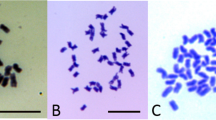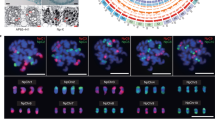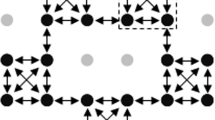Abstract
CYTOLOGICAL observations carried out in this laboratory on Pennisetum squamulatum an East African1 grass species, and on its F 1 hybrid2 with pearl millet (Pennisetum typhoides Stapf and Hubb.), have suggested that P. squamulatum is an auto-allopolyploid.
This is a preview of subscription content, access via your institution
Access options
Subscribe to this journal
Receive 51 print issues and online access
$199.00 per year
only $3.90 per issue
Buy this article
- Purchase on Springer Link
- Instant access to full article PDF
Prices may be subject to local taxes which are calculated during checkout
Similar content being viewed by others
References
“Index Kewensis”, 11, 459 (1893).
Joshi, A. B., and Patil, B. D., Proc. Eighth Internat. Grassland Congr., Reading, 1960 (in the press).
Raman, V. S., Chandrasekharan, P., and Krishnaswamy, D., Curr. Sci., 28, 127 (1959).
Stebbins, jun., G. L., “Variation and Evolution in Plants”, 315 (1950).
Author information
Authors and Affiliations
Rights and permissions
About this article
Cite this article
PATIL, B., HARDAS, M. & JOSHI, A. Auto-Alloploid Nature of Pennisetum squamulatum Fresen. Nature 189, 419–420 (1961). https://doi.org/10.1038/189419b0
Issue Date:
DOI: https://doi.org/10.1038/189419b0
This article is cited by
-
Learning to tango with four (or more): the molecular basis of adaptation to polyploid meiosis
Plant Reproduction (2023)
-
Alien genome mobilization and fixation utilizing an apomixis mediated genome addition (AMGA) strategy in Pennisetum to improve domestication traits of P. squamulatum
Theoretical and Applied Genetics (2022)
-
Morphological, cytological and reproductive characterization of tri-species hybrids (GOS) between Pennisetum glaucum, P. orientale and P. squamulatum
Euphytica (2010)
-
Microsporogenesis, reproductive behavior, and fertility in five Pennisetum species
Theoretical and Applied Genetics (1984)
-
Cytogenetics of double cross hybrids between Pennisetum americanum — P. purpureum amphiploids and P. americanum x Pennisetum squamulatum interspecific hybrids
Theoretical and Applied Genetics (1984)
Comments
By submitting a comment you agree to abide by our Terms and Community Guidelines. If you find something abusive or that does not comply with our terms or guidelines please flag it as inappropriate.



